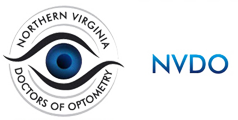Intraocular pressure (IOP) refers to the pressure in your eyes. When that pressure is unusually high, it causes ocular hypertension. Although ocular hypertension is not an eye disease, it is often an indicator of one’s risk of glaucoma. Ocular hypertension is commonly found in adults over 40. Race and family history are known risk factors as well as being nearsighted or having thin central corneas.

What Causes Ocular Hypertension?
There are five common reasons for high eye pressure that can lead to ocular hypertension:
- Aqueous overproduction: Aqueous humor is a clear, watery fluid in the eye behind the iris. It helps maintain pressure by bathing and carrying oxygen and nutrients to the lens. It flows through the pupil and fills the space between the iris and cornea, and then drains through the trabecular meshwork. However, the body sometimes produces too much aqueous humor, which causes increased eye pressure.
- Slow aqueous drainage: The aqueous humor accumulates and drains too slowly if there are issues with the drainage system. Even if the body produces the right amount of liquid, inadequate drainage can lead to ocular hypertension.
- Trauma to the eye: Some eye injuries disrupt or affect the balance of aqueous production and drainage, causing high eye pressure. It’s also worth noting that trauma can affect your eyes months or years after the actual injury takes place. Let your eye doctor know if you’ve had an injury in the past.
- Medications: Many steroid medications, including steroidal eye drops, can cause high eye pressure.
- Other eye issues: Eye conditions, such as corneal arcus, pigment dispersion syndrome and pseudoexfoliation syndrome, are linked with ocular hypertension.
When Is Ocular Hypertension Serious?
Since ocular hypertension puts you at a higher risk of developing glaucoma, it would make you a “glaucoma suspect”. Glaucoma is an eye disease that can damage your optic nerve and ultimately lead to visual loss. Your eye doctor will have to closely monitor your eye pressure and recommend steps to reduce it.
To reduce eye pressure, your eye doctor may prescribe special eye drops. You can also improve your overall eye health through good lifestyle choices. Eating a healthy diet that includes lots of fruits and vegetables, staying hydrated and limiting caffeine consumption are great ways to control high eye pressure.
Getting an eye exam at least once a year helps detect certain eye conditions. Turn to Northern Virginia Doctors of Optometry to schedule one! For residents in Alexandria, call us at (703) 660-9494; for Arlington (Crystal City), call (703) 413-1400; for Arlington (Clarendon), call (703) 522-7676; for Falls Church, call (703) 573-1200; and for Reston, call (703) 467-9080. You can also fill out our online form to set an appointment.



























